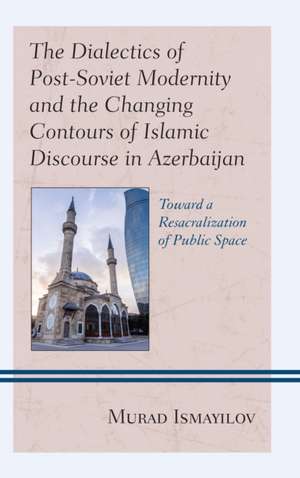DIALECTICS OF POST SOVIET MODECB: Contemporary Central Asia: Societies, Politics, and Cultures
Autor Murad Ismayiloven Limba Engleză Hardback – apr 2018
Din seria Contemporary Central Asia: Societies, Politics, and Cultures
- 19%
 Preț: 514.71 lei
Preț: 514.71 lei - 19%
 Preț: 674.98 lei
Preț: 674.98 lei -
 Preț: 399.58 lei
Preț: 399.58 lei - 23%
 Preț: 688.08 lei
Preț: 688.08 lei -
 Preț: 377.06 lei
Preț: 377.06 lei -
 Preț: 433.58 lei
Preț: 433.58 lei - 27%
 Preț: 718.37 lei
Preț: 718.37 lei - 27%
 Preț: 846.92 lei
Preț: 846.92 lei - 27%
 Preț: 716.27 lei
Preț: 716.27 lei - 27%
 Preț: 1026.59 lei
Preț: 1026.59 lei - 23%
 Preț: 647.76 lei
Preț: 647.76 lei - 23%
 Preț: 685.98 lei
Preț: 685.98 lei -
 Preț: 488.76 lei
Preț: 488.76 lei -
 Preț: 388.08 lei
Preț: 388.08 lei - 27%
 Preț: 679.67 lei
Preț: 679.67 lei - 23%
 Preț: 589.13 lei
Preț: 589.13 lei - 23%
 Preț: 684.64 lei
Preț: 684.64 lei -
 Preț: 351.87 lei
Preț: 351.87 lei - 27%
 Preț: 755.64 lei
Preț: 755.64 lei - 27%
 Preț: 683.22 lei
Preț: 683.22 lei -
 Preț: 396.30 lei
Preț: 396.30 lei - 27%
 Preț: 855.84 lei
Preț: 855.84 lei - 27%
 Preț: 788.11 lei
Preț: 788.11 lei -
 Preț: 386.17 lei
Preț: 386.17 lei - 27%
 Preț: 816.44 lei
Preț: 816.44 lei - 27%
 Preț: 795.17 lei
Preț: 795.17 lei - 27%
 Preț: 699.63 lei
Preț: 699.63 lei -
 Preț: 402.55 lei
Preț: 402.55 lei -
 Preț: 315.47 lei
Preț: 315.47 lei - 23%
 Preț: 537.18 lei
Preț: 537.18 lei
Preț: 685.09 lei
Preț vechi: 889.74 lei
-23% Nou
Puncte Express: 1028
Preț estimativ în valută:
131.09€ • 137.24$ • 108.47£
131.09€ • 137.24$ • 108.47£
Carte tipărită la comandă
Livrare economică 05-19 aprilie
Preluare comenzi: 021 569.72.76
Specificații
ISBN-13: 9781498568364
ISBN-10: 149856836X
Pagini: 228
Dimensiuni: 152 x 229 x 22 mm
Greutate: 0.5 kg
Editura: Rowman & Littlefield
Seria Contemporary Central Asia: Societies, Politics, and Cultures
ISBN-10: 149856836X
Pagini: 228
Dimensiuni: 152 x 229 x 22 mm
Greutate: 0.5 kg
Editura: Rowman & Littlefield
Seria Contemporary Central Asia: Societies, Politics, and Cultures
Notă biografică
Murad Ismayilov is doctoral researcher in development studies and research fellow at the Central Asia Forum at the University of Cambridge.
Descriere
This study examines the relationship between the Azerbaijani state and its society in the post-Soviet period. The author analyzes the growing cooperation between secular and religious sectors, the normalization of Islamic discourse, and elite attitudes toward Islam.
